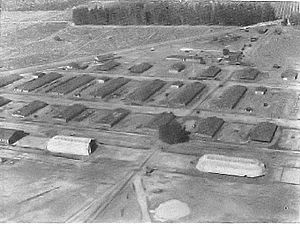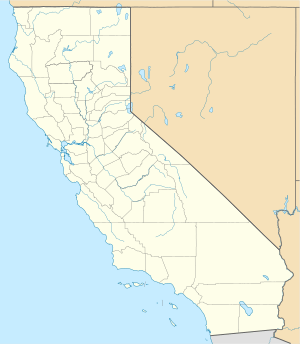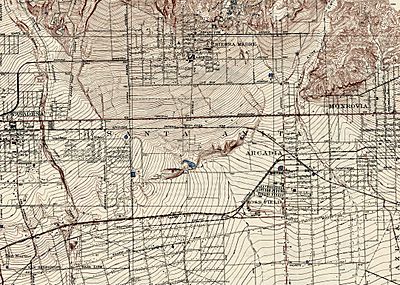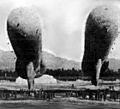Ross Field (airfield) facts for kids
Quick facts for kids Ross FieldArcadia Intermediate Landing Field |
|
|---|---|
| Arcadia, California | |

Army Balloon School at Camp Ross, California, 1918
|
|
| Coordinates | 34°07′46″N 118°02′24″W / 34.12944°N 118.04000°W |
| Type | Pilot training airfield |
| Site information | |
| Controlled by | |
| Condition | Redeveloped into urban area |
| Site history | |
| Built | 1918 |
| In use | 1918–1940 |
| Battles/wars | World War I |
| Garrison information | |
| Garrison | Training Section, Air Service |
Ross Field was a special military airfield used during World War I. It was located about 0.8 miles (1.3 km) southwest of Arcadia, California.
This field was one of 32 training camps set up by the Air Service, United States Army. These camps were created after the United States joined World War I in April 1917. Ross Field was used for training from 1918 to 1919.
Contents
History of Ross Field
World War I Training
In June 1918, the U.S. Army built an airfield in Arcadia. It was placed on the grounds of the Santa Anita Race Track. This new camp was set up to train soldiers to use observation balloons.
Soon after, soldiers from other camps arrived. They quickly set up a tent camp. Training began right away, and balloons were flying by the end of June. A special plant was built to make hydrogen gas. This gas was needed to fill the huge balloons. By the end of summer, most of the buildings were finished.
Windy Challenges
When the Army chose this spot for a balloon school, they didn't think about the strong Santa Ana winds. These winds blow in from the desert. The winds made it very hard to fly the balloons. They also made ground training difficult.
Because of the strong winds, balloons could not fly very high. To practice observing from high up, officers were driven to the top of Mount Wilson. From there, they could watch live artillery fire far below. The height of Mount Wilson was similar to being in a balloon basket. This way, they could practice without the wind problems.
Honoring Lieutenant Ross
In November, the school was named Ross Field. It was named after Lieutenant Cleo J. Ross. He was an observer with the 8th Balloon Company. On September 26, 1918, in France, his balloon was attacked by a German plane. The balloon caught fire.
Lieutenant Ross waited to jump until his fellow officer was safe. After he jumped, burning pieces of the balloon fell onto his parachute. He fell to his death from 3,000 feet (914 meters). Lieutenant Ross was the only U.S. Army balloon pilot or observer killed in action during the war. He was buried in France. None of the companies trained at Ross Field were sent overseas.
After the War
While it was open, the balloon school at Ross Field trained about 200 officers. After World War I ended, the field was closed in the spring of 1919. Most of the soldiers were released from the Army. Some equipment and remaining soldiers were moved to other bases. The Army officially sold Ross Field on March 1, 1926.
After World War I
After the war, Ross Field was sometimes used as a small airport for civilian planes. It was called Arcadia Intermediate Landing Field. However, it was not very big because it was originally built for balloons.
Starting in 1922, Ross Field became a private airfield. This is where a famous pilot named Pancho Barnes learned to fly. In 1930, one of the old hangars was used to film a scene for the movie "Hells Angels". This scene showed a Zeppelin, a type of airship.
In 1933, the Army gave 183 acres (74 hectares) of the land to Los Angeles County. The plan was to turn it into a park. The land mostly sat empty until 1935. Then, it was given to the city of Arcadia. The airfield likely closed by 1940.
Today, the area where Ross Field once stood is mostly a golf course. It is located southwest of the intersection of Santa Anita Avenue and Huntington Drive.
Images for kids






